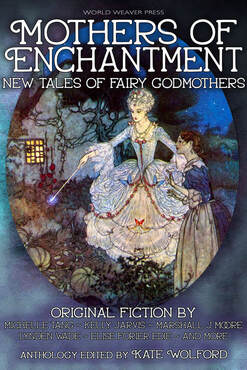 Guest Blog by Vivica Reeves When the subject of fairy godmother or magical helper comes up, sometimes it is hard to stray away from the image of a kind, old magical being — usually female— who arrives in our darkest hour of need. But what happens in their darkest hour? Who comes to help them? What tragedies encouraged them to help others? These questions spurred on my thoughts and decision to retell the tale of Morozko. Well, actually, I specifically chose Morozko because I wanted a fatherly version of the fairy godmother role. While I could have simply made a fairy godmother in another story a father, I wanted a tale with a godfather in it. I wanted to have him be in and a part of the story, not just a change that I threw in. A main reason for this is because my dad was in the military when I was a kid. My father would leave to go on tours and when he got out of the military, he went onto contract work. Still going, going, and going. While I was not as close to him as I was my mother, I still loved him. He would bring little gifts from his tours or had advice about growing up in the time I did spend with him or see him. I admired him and saw him as the hero of my stories. Better yet, he was like the mystical helper I could rely on, a fairy godfather. Then one day, he couldn’t come to one of my softball games. I was a C-string (low level) player, not that good. But I was promised to be out in the field and playing that game. I told my parents to come. My dad said he couldn’t. He wanted to, but couldn’t. So I shrugged my shoulders. The hero and the magical helper couldn’t be expected to be there at all times. So I went on, thinking he wouldn’t come. But he did. He was there when I played. My team won, and through it all he cheered me on. He told me he wanted to be there because his parents weren’t at any of his games and it wasn’t okay that I was okay with that like he was. In that moment, my dad wasn’t just this magical helper, or hero, but a person. A person who I could connect to and see all the sadness and hurt that I felt too but didn’t know. He knew, he saw my hurt and his own. Together, we healed and he was my dad, my healing helper. At that moment, my dad taught me that everyone has a story. The scars from their story are still hurting. So I read stories and wondered, what happens in this character’s darkest hours? Who comes to help them? What tragedies encouraged them to help (or hurt) others? In my retelling of Morzoko, “Forgetful Frost,” I wanted to show that feeling of connection once more. Yes, Morzoko does help a young girl at her darkest hour. He even saves her from her troubles, but she also helps him. He is also hurting. He is human, despite his magical help. I wanted Forgetful Frost to be a story where people (magical or not) connect and heal together. They became healing helpers to each other. In “Forgetful Frost,” and the other amazing stories in Mothers of Enchantment, we see fairy godmothers (and fathers) at their best and worst. Through these stories, we are asked as readers to see fairy godmothers, or the magical helpers, as people. Not just these magical beings that pop into the story to save the deserving hero or punish the wicked villains. They are not perfect or all-knowing. They can be clumsy, different, wrong, forgetful at the same time they are caring, wise, encouraging, and magical. They are people who are hurting, and healing, and who want to help. So as you read these stories, I encourage you to see where your magical helpers are, and be their healing helpers. Help them and yourself heal. In that healing, lies the true magic.
0 Comments
Your comment will be posted after it is approved.
Leave a Reply. |
World Weaver PressPublishing fantasy, paranormal, and science fiction. Archives
February 2024
|
- Home
-
Books
-
All Books
>
- Beyond the Glass Slipper
- Bite Somebody
- Bite Somebody Else
- Black Pearl Dreaming
- Cassandra Complex
- Causality Loop
- Clockwork, Curses, and Coal
- Continuum
- Corvidae
- Cursed: Wickedly Fun Stories
- Dream Eater
- Equus
- Fae
- Falling of the Moon
- Far Orbit
- Far Orbit Apogee
- Fractured Days
- Frozen Fairy Tales
- Glass and Gardens: Solarpunk Summers
- Glass and Gardens: Solarpunk Winters
- Grandmother Paradox
- Grimm, Grit, and Gasoline
- Haunted Housewives
- Heir to the Lamp
- He Sees You When He's Creepin': Tales of Krampus
- Into the Moonless Night
- Jack Jetstark's Intergalactic Freakshow
- King of Ash and Bones (ebook)
- Krampusnacht
- Last Dream of Her Mortal Soul
- Meddlers of Moonshine
- Mothers of Enchantment
- Mrs Claus
- Multispecies Cities
- Murder in the Generative Kitchen
- Recognize Fascism
- Scarecrow
- Sirens
- Shards of History
- Shattered Fates
- Skull and Pestle
- Solarpunk (Translation)
- Solarpunk Creatures
- Solomon's Bell
- SonofaWitch!
- Speculative Story Bites
- Trenchcoats, Towers, and Trolls
- Weredog Whisperer
- Wolves and Witches
- Anthologies and Collections
- Novels
- Novellas
- Fairy Tale
- Fantasy
- Romance
- Science Fiction
- Urban/Contemporary Fantasy
- Young Adult SFF
-
All Books
>
- Blog
- About
- Contact
- Press / Publicity
- Newsletter Signup
- Privacy Policy
- Store

 RSS Feed
RSS Feed